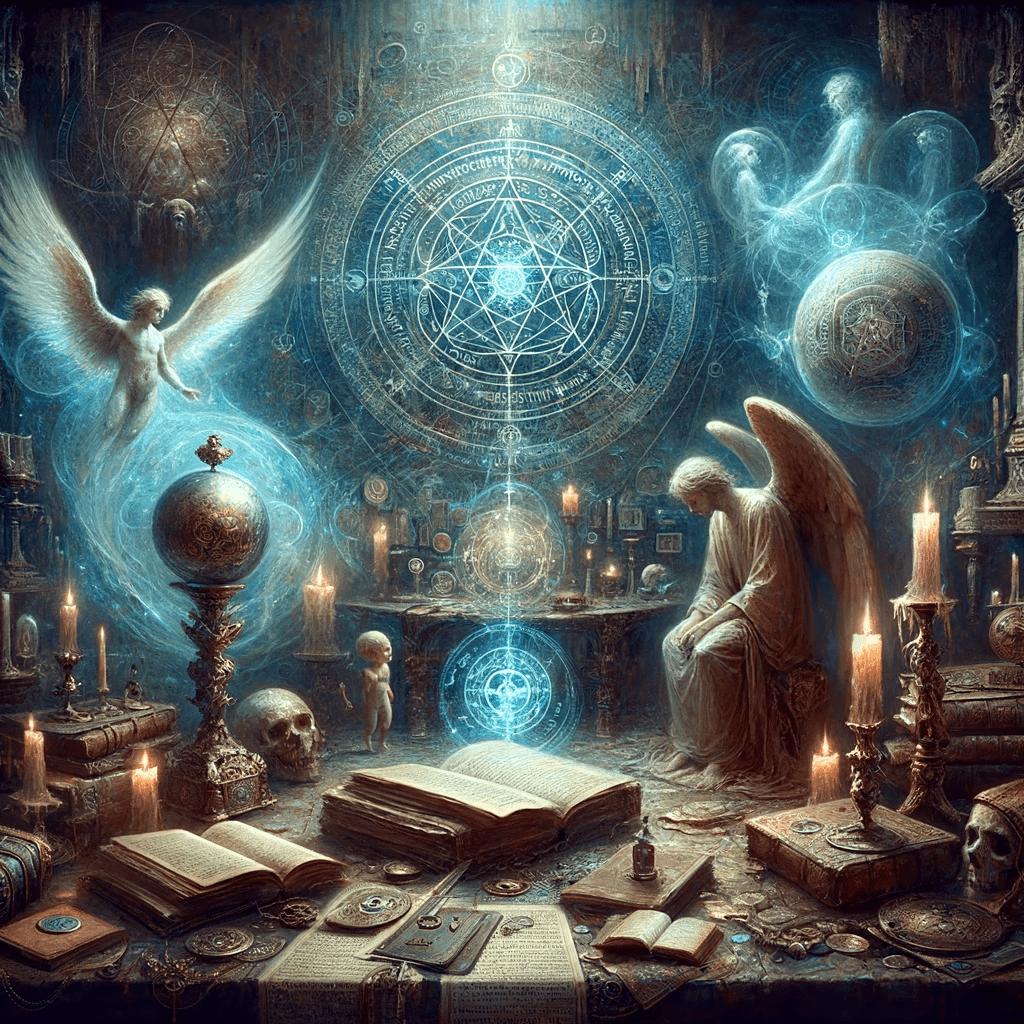Enochian Saga of John Dee and Edward Kelley

The Enochian Saga of John Dee and Edward Kelley is a fascinating and intricate tale that looks into the realms of mysticism, language, and the occult during the Renaissance period. The saga begins with the historical context of mystics’ fascination with ancient, dead languages, deemed ideal for sacred purposes due to their unchanging nature and perceived sanctity. The pursuit of a primordial language, untouched and delivered by a divine entity, sets the stage for the story of John Dee and Edward Kelley.
Dee, a renowned mathematician, linguist, navigator, inventor, astronomer, and astrologer, was also a devoted Christian, heavily influenced by Hermetic philosophies. He believed in the interconnection between the divine and the natural world, leading him to study theurgy – the practice of invoking supernatural entities to uncover ancient mysteries.
Theurgy is a practice and philosophical system that focuses on the invocation or evocation of deities, divine powers, or other supernatural entities, typically for the purpose of spiritual transformation and enlightenment. The term “theurgy” literally means “divine-working” in Greek, where “theos” means “god” and “ergon” means “work”.
In the practice of theurgy, rituals, prayers, and meditations are used as a way to purify the soul and elevate it towards a higher spiritual reality. Theurgists believe that through these practices, they can achieve a direct experience of the divine, which not only leads to personal transformation but also brings them closer to the ultimate reality.
Edward Kelley, Dee’s partner in this endeavor, was a man of a more enigmatic past, known for his alchemical knowledge and skill in scrying – the practice of seeing visions in reflective surfaces.
Scrying is an ancient divinatory practice involving the use of reflective surfaces, such as mirrors, water, crystal balls, or other shiny objects, to gain mystical insight or to see visions that are believed to reveal the past, present, or future. This practice is rooted in the belief that these reflective surfaces can act as a medium to access the subconscious mind, spiritual realms, or to receive supernatural guidance.
The saga unfolds with Kelley receiving visions from angels, who communicate in a celestial language. This language, referred to as Enochian, is believed to be the language of God and angels, linking back to the biblical figures of Adam and Enoch. The narrative describes how Adam, in the Garden of Eden, originally spoke this celestial language, losing his fluency after being expelled from paradise. Enoch, the seventh generation from Adam, is portrayed as a key figure, deemed worthy by archangels to revisit this divine language.
Dee and Kelley’s journey is marked by their attempt to decipher the complex Enochian language through a series of cryptographic puzzles delivered by the angels. These puzzles, contained in the Book of Logaeth, were said to hold the keys to unlocking the gates of heaven. The language itself, considered to be pure, untouched, and delivered directly by divine beings, presented a daunting challenge for Dee and Kelley.
Throughout their partnership, Dee and Kelley engaged in rigorous scrying sessions, documenting every detail of their angelic communications. Their work led them to receive the 48 Keys, an esoteric collection of poetic verses requiring deep knowledge in astrology, Hebrew mysticism, and numerology to interpret. The authenticity and functionality of the Enochian language have been a subject of debate among linguists and historians, with some considering it a real language, while others view it as a product of mystical invention.
The relationship between Dee and Kelley becomes strained, leading to their eventual separation. The story of John Dee concludes with a return to England, where he faces hardship and loss, his work and contributions to the study of the celestial language becoming his enduring legacy. The Enochian Saga of John Dee and Edward Kelley remains a captivating narrative that intertwines history, language, and mysticism, leaving a lasting impact on the fields of linguistics, the occult, and Renaissance studies.

